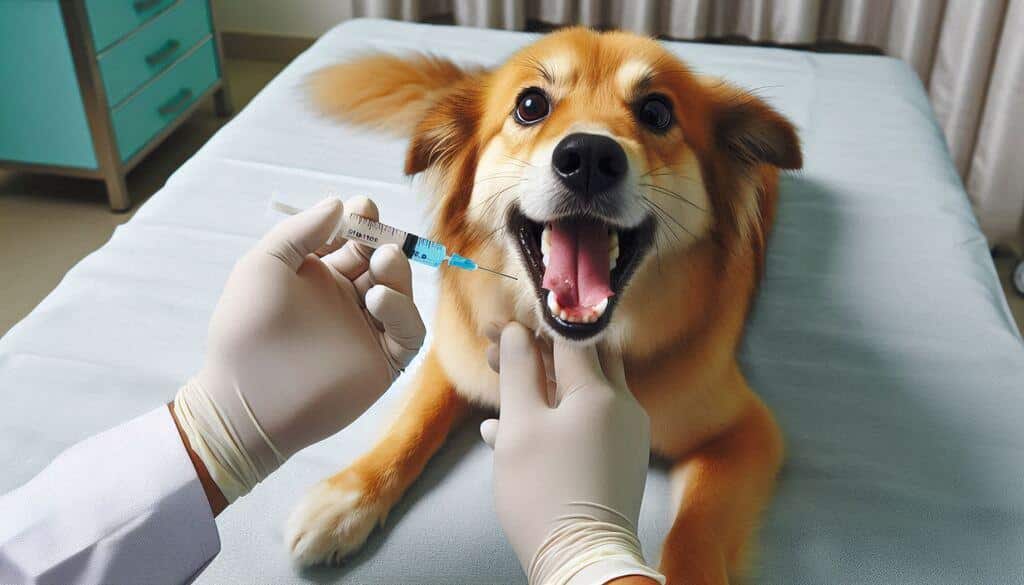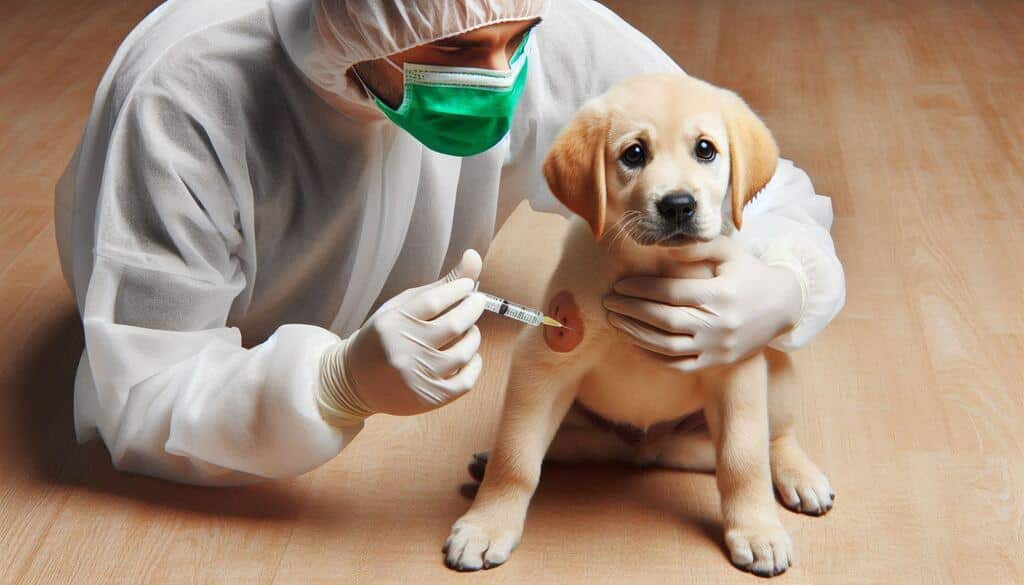Rabies is a fatal viral disease that affects the nervous system of mammals, including dogs and humans. Vaccination is the most effective way to protect your canine companion from this deadly disease. However, like any medical procedure, rabies shots can sometimes cause side effects in dogs. Understanding the potential dog reaction to rabies shot is crucial for pet owners to ensure their furry friends’ well-being.
This article provides a detailed guide on what to expect after your dog receives a rabies vaccination, including common reactions, rare side effects, and when to seek veterinary attention.
In most states, the rabies vaccine is legally required for dogs. This is because rabies is a zoonotic disease, meaning it can be transmitted from animals to humans. Vaccinating pets helps protect public health.
Facilities like The Dog House Pet Salon require the rabies vaccine to ensure the safety of all pets in our care. Rabies is highly contagious, and an outbreak could have devastating consequences.
Knowing your dog is protected against rabies gives you peace of mind, especially if they spend time outdoors or in areas where wildlife is present.
Rabies vaccination isn’t just about protecting individual dogs, and it’s about safeguarding the entire community. Widespread vaccination helps create herd immunity, reducing the overall risk of rabies transmission. This is especially important in areas where wildlife rabies is prevalent.
According to the Centers for Disease Control and Prevention (CDC), rabies vaccination programs have significantly reduced the number of human rabies cases in the United States. By vaccinating your dog, you’re playing a vital role in this public health effort.

The rabies vaccine is designed to stimulate your dog’s immune system to recognize and fight the rabies virus. Here’s a step-by-step breakdown of how it works:
The vaccine contains inactivated or modified forms of the rabies virus. These antigens are harmless but enough to trigger an immune response.
When the vaccine is administered, your dog’s immune system recognizes the antigens as foreign invaders. This prompts the production of antibodies, which are specialized proteins designed to neutralize the virus.
In addition to producing antibodies, the immune system creates memory cells. These cells “remember” the virus, allowing for a rapid and effective response if your dog is ever exposed to rabies in the future.
The rabies vaccine provides long-lasting immunity, typically lasting 1-3 years depending on the type of vaccine and local regulations. Regular boosters are required to maintain protection.
Most dogs experience mild and temporary reactions after a rabies shot. These common side effects are usually a sign that your dog’s immune system is working to build protection against the rabies virus. Here are some of the most frequently observed reactions:
These common reactions are generally mild and don’t require any specific treatment. However, it’s essential to monitor your dog closely and contact your veterinarian if you have any concerns.

While most dogs tolerate rabies vaccinations well, some may experience more severe reactions. These are less common but require immediate veterinary attention. Here are some rare but serious side effects to watch out for:
If you observe any of these rare but serious side effects after your dog’s rabies vaccination, don’t hesitate to contact your veterinarian immediately. Prompt treatment can significantly improve the outcome.
While most dog reactions to rabies shot are mild and self-limiting, there are some things you can do to make your furry friend more comfortable:
If you have any concerns about your dog’s reaction to the rabies shot, don’t hesitate to contact your veterinarian for advice.
Rabies is a deadly disease, and vaccination is the only way to protect your dog and your family from this fatal virus. While some dogs may experience mild reactions to the rabies shot, the benefits of vaccination far outweigh the risks. The dog’s reaction to the rabies shot is usually temporary and manageable, while rabies infection is always fatal.
At The Dog House Pet Salon, we’re committed to creating a safe and comfortable environment for your pet. Our vaccination requirements, including the rabies vaccine, are designed to protect every dog in our care.
Whether your dog is staying with us for Houston Pet Boarding or enjoying a day of fun at our Doggy Daycare, you can trust that their health and safety are our top priorities.
Ready to book your dog’s stay? Visit our Houston Pet Boarding page or book an appointment with us today to learn more about our services and requirements. Together, we can keep every tail wagging and every nose healthy!
Understanding the potential dog reaction to rabies a shots is essential for responsible pet ownership. While most dogs experience only mild and temporary side effects, it’s crucial to be aware of the rare but serious reactions that can occur.
You can ensure their safety and well-being by monitoring your dog closely after vaccination and seeking prompt veterinary attention when needed. Remember, rabies vaccination is a vital part of your dog’s preventive healthcare, protecting them and your family from this deadly disease.
Managing your dog’s reaction involves providing a comfortable resting place, fresh water, monitoring their appetite, limiting activity, and observing the injection site. While some dogs experience mild reactions, the benefits of rabies vaccination far outweigh the risks.
Rabies vaccination is vital for your dog’s health. For safe and loving care for your dog in Houston, consider our dog boarding services, doggy daycare, and pet grooming services. Subscribe to our newsletter for more pet care tips!
The team and staff here at The Dog House Pet Salon continue to closely monitor and comply with both local and state regulations with sanitation standards during the COVID-19 outbreak. Our customer’s health continues to be our highest priority, especially during this time.
Copyright Ⓒ 2025 The Dog House PS. All rights reserved.
7:00 am – 7:00 pm
7:00 am – 7:00 pm
7:00 am – 7:00 pm
7:00 am – 7:00 pm
7:00 am – 7:00 pm
8:00 am – 6:00 pm
Closed
**Sunday boarding drop off & pick up from 8am-9am or 4pm-5pm only**
** Normal business closed. Pet Boarding Pick-Up & Drop Off Only**
7:00 am – 6:00 pm
7:00 am – 6:00 pm
7:00 am – 6:00 pm
7:00 am – 6:00 pm
7:00 am – 6:00 pm
8:00 am – 6:00 pm
Closed
Closed
4:00 pm – 5:00 pm
Closed
4:00 pm – 5:00 pm
Closed
4:00 pm – 5:00 pm
Closed
4:00 pm – 5:00 pm